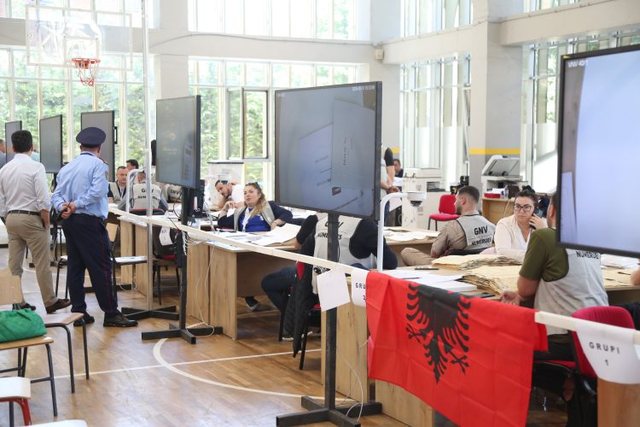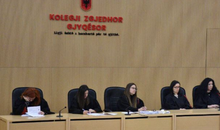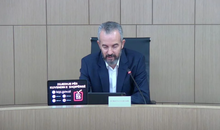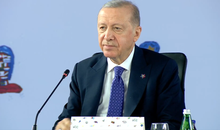
 Flash News
Flash News
Diaspora votes/Gaffe or manipulation?! 43 thousand ballots are counted, while only 42 thousand voters were registered
Polish writer: Long live the party, long live the new generation of Albanian politicians with mafia support!
Armored vehicle attacked with Kalashnikov rifle in Greece, driver escapes
Elections 2025/ Around 50 thousand envelopes pending, vote counting in Greece begins today
Morning Post/ In 2 lines: What mattered yesterday in Albania
After limited success, new parties turn their eyes back to the electoral system

Three new parties challenged the duopoly of Albanian politics and secured parliamentary mandates in the May 11 elections outside the two major camps, but their electoral success was limited by the provisions of the Electoral Code. By Thursday afternoon, the small parties had collectively received over 150,000 votes, but only three of them managed to translate them into parliamentary mandates.
The coalition “Nisma Shqipëria Bëhet” of Adriatik Lapaj and Endrit Shabani, the party “Mundësia” of Agron Shehaj and the “Lëvizja Bashkë” of Arlind Qori will be parliamentary parties outside the two major camps. Although all three are united by an anti-establishment spirit, the young people rejected the idea of a union before the elections and often fought against each other during the campaign.
They read the thousands of votes cast for their political bids as public trust to be represented in the Assembly, a representation that will anyway be limited due to the regional proportional system.
Adriatik Lapaj from the "Albania Becomes Initiative" told BIRN that their objective will be to change the Electoral Code in order to open the competition.
"The electoral system holds the country's democratization hostage, because through artifice it does not allow the political will of citizens to be reflected," said Lapaj.
Agron Shehaj also sees the electoral system as a penalizing factor for his party, which was created 10 months ago.
"The system is built to make change impossible, we need a more representative code," said Shehaj, describing his change as a political objective.
On the other hand, Shehaj believes that a pre-election alliance between the new parties was pointless and each of them had to understand the public's support.
"We did not reject the coalition, we rejected the merger. We needed to show public opinion how much support we had, and the first elections for us showed that we achieved results beyond the expectations of public opinion and the two major parties that were attacking us," he added.
Meanwhile, Dashamir Shehi, a long-time politician who led the "Right for Development" coalition but failed to be represented in the Assembly, sees the success of young people as a good thing for politics.
"They are young, energetic," said Shehi, as he predicted their further political growth.
But Shehi expresses regret that the votes cast for alternatives other than the SP and the DP failed to be adequately represented in the Assembly and believes that the mandate calculations would be different if there were a pre-election alliance between them.
According to Shehi, "they would have more mandates today if they had brought other small parties closer to them on the basis of proximity and ideology."
The need for new alternatives
The Chairman of the Mundësia Party, Agron Shehaj, during the debate on the votes in CEAZ no. 40
Partitë e reja edhe pse u futën në një garë të pabarabartë të burimeve financiare, njerëzore e mediatike, shënuan një shtrirje kombëtare duke marrë vota në çdo qark, një tregues që për njohësit e politikës, lidhet me nevojën e elektorarit për alternativa të reja politike.
Luljeta Progni, gazetare politike, e quan këtë rezultat një moment të rëndësishëm për skenën politike pas një kohe të gjatë të mbizotërimit të partive të vjetra.
“Edhe pse fiton pak mandate, ky rezultat mund të konsiderohet një sukses domethënës në kontekstin aktual politik,” thotë Progni, duke shtuar se “kjo dëshmon nevojën e elektoratit për një alternativë të re përkundrejt dy partive të hershme PS dhe PD që kanë mbajtur të polarizuar politikën për 35 vjet”.
Progni e përshkruan rrugën e tyre deri në 11 maj si shumë të vështirë.
“Një nga pengesat kryesore ishte vetë ambienti shoqëror dhe politik, i cili tradicionalisht ka qenë skeptik dhe shpeshherë mosbesues ndaj alternativave të reja,” thekson ajo duke sjellë shembuj të iniciativave të mëparshme që kanë dështuar të hynë në parlament.
Edhe për Eduart Gjokutajn, themelues i organizatës së edukimit financiar “Altax”, vota për këto parti tregon një rritje të interesit të votuesve për alternativa që flasin për drejtësi sociale, shtet garantues, dhe reforma ekonomike gjithëpërfshirëse.
“Vota për partitë e reja në zgjedhjet e vitit 2025 tregon një dëshirë për ndryshim dhe përfaqësim të alternativave të reja, veçanërisht për ato që prekin drejtësinë sociale dhe rishikimin e sistemit tatimor,” vëren Gjokutaj.
Megjithatë, sipas tij edhe pse këto parti arritën të tërheqin rreth 8% të votuesve, ato u penalizuan nga shpërndarja joproporcionale e mandateve sipas sistemit zgjedhor, që favorizon partitë më të mëdha.
Garë e pabarabartë
Dy drejtuesit e koalicionit Nisma “Shqipëria Bëhet”, Adriatik Lapaj dhe Endrit Shabani
Partitë e reja bënë fushatë në një terren të dominuar nga liderët e dy partive kryesore dhe një garë të pabarabartë nga pikëpamja e burimeve financiare, strukturave patronazhiste, përdorimit të adminstratës dhe ndikimit mediatik nga dy partitë e mëdha.
Nga ana tjetër, ato garuan me një sistem zgjedhor të miratuar nga PS-PD dhe që perceptohet si i pabarabartë për lëvizjet e reja, pasi nuk reflekton vullnetin e votuesve, por favorizon partinë që merr më shumë vota.
Të gjitha këto shihen prej ekspertëve si elementë dekurajues dhe penalizues për partitë e reja.
Sipas Prognit, një sërë faktorësh kanë qenë në disfavor të alternativave të reja, që nga rrjetet tradicionale të pushtetit dhe ndikimit në elektorat nga dy partitë mëdha, sistemi elektoral e deri tek mungesa e përvojës së tyre elektorale.
“Por pjesa më sfiduese”, sugjeron ajo, “është padyshim fushata agresive e mazhorancës, ku e gjithë makineria e pushtetit, administrata, ishte në funsksion të votës për të rifituar mandatin qeverisës”.
Progni adds that other hindering factors were internal, such as a lack of political experience, still fragile organizational structures, and limited space in the media.
While for Gjokutaj, their biggest penalty was the legal formula for distributing mandates, which does not really reflect the percentage of votes they won.
"The distribution of votes of small forces has not resulted in fair representation, and for this reason they managed to win only a few mandates," Gjokutaj analyzes, emphasizing that the favoring of the dominant party in terms of the number of mandates by this system has limited the ability of new forces to obtain more deputies.
“This disproportionate distribution of mandates has created a visible barrier for new parties that have managed to gain considerable support in some districts, but which have ultimately been left with limited representation in parliament,” he concludes./ BIRN
Latest news


May 11, Celibashi: 109 extra ballots are found, we are conducting verifications
2025-05-17 14:39:41


Green or yellow? This is the healthiest banana
2025-05-17 13:50:30


Berisha: The right of Albanians to vote as free citizens is our greatest goal
2025-05-17 13:03:20

Rei Nozllin punched the secretary of CEAZ No. 30 in Kashar, he is left in prison
2025-05-17 12:41:43
Caught with cannabis, two young people arrested in Tirana
2025-05-17 12:27:02
Topalli accuses of massive manipulation of votes from the Greek diaspora
2025-05-17 12:13:57
Vote counting from Greece, PD: Not to be included in the final result
2025-05-17 11:59:01

Ukraine peace talks, Macron: Faced with Putin's cynicism, Trump will react
2025-05-17 11:18:54
Criticism of Vjosa Osmani, Macron: I hope that dialogue will resume next week
2025-05-17 11:01:28
Dreams won't come true for others.
2025-05-17 10:41:56
Tonight's 'Eurovision 2025' final, Shkodra 'Elektronike' performs 26th
2025-05-17 10:23:07
Armored vehicle attacked with Kalashnikov rifle in Greece, driver escapes
2025-05-17 09:59:38
French President Macron arrives at the Prime Minister's Office, welcomed by Rama
2025-05-17 09:41:11

Foreign exchange/ How much foreign currencies are bought and sold today
2025-05-17 09:03:11
After limited success, new parties turn their eyes back to the electoral system
2025-05-17 08:54:39
"Relaxation is the motto", the stars' forecast for your sign
2025-05-17 08:38:32
Weather forecast for today
2025-05-17 08:25:13
Morning Post/ In 2 lines: What mattered yesterday in Albania
2025-05-17 08:00:30
Zhulali: Rama has transformed Albania's foreign policy into his personal policy
2025-05-16 22:57:14
EU concerned about recent operations in northern Kosovo
2025-05-16 22:42:45


VIDEO/ Rama kneels in Tirana, Meloni "puts in the scissors"
2025-05-16 21:48:15



Britain and North Macedonia reach agreement on strategic partnership
2025-05-16 21:07:11

Israeli forces do not stop barrage against Houthis, bombard port
2025-05-16 20:43:28
Two vehicles collide on the Laç-Patok axis, one of the drivers injured
2025-05-16 20:30:56
A couple of tourists from Arabia have an accident in Berat
2025-05-16 20:26:52


Danish Prime Minister: Rearmament of Europe should be everyone's priority
2025-05-16 19:59:28
They were distributing cocaine, the Italian-Albanian drug gang is arrested
2025-05-16 19:46:11

Why broccoli is one of the healthiest vegetables you can eat
2025-05-16 19:27:29


Sali Berisha joins the protest
2025-05-16 18:41:56
Opposition protest, Bylykbashi: This electoral system must definitely change
2025-05-16 18:35:49
Will Berisha resign? Topalli: Hasty decisions are not made in times of boredom
2025-05-16 18:28:27

"Big" Summit, shops locked and citizens stranded
2025-05-16 18:10:04
Will Meta resign from his mandate to enter parliament? Tedi Blushi answers
2025-05-16 17:57:59
Opposition protest, Këlliçi: Rama will not enjoy the stolen mandate
2025-05-16 17:48:34

Noka from the protest: Rama and his gang will not have peace
2025-05-16 17:40:21
The protest announced by the opposition begins: We want our votes!
2025-05-16 17:25:40



Electoral College rejects DP's request for Greek votes
2025-05-16 16:36:27
DP protest/Police officers on the ground, metal fence installed
2025-05-16 16:35:50


Rama's white sneakers caught Erdogan's attention, here's what he said
2025-05-16 16:05:22

Tabaku deepens the result against Alimehmet
2025-05-16 15:51:49
CEC decides on Greek envelopes: Vote counting to continue
2025-05-16 15:40:38
INSTAT: Population decline continues in Albania
2025-05-16 15:35:01
Rama's gala at the summit turns European leaders into children with AI
2025-05-16 15:21:17
Meloni calls Edi Rama's victory in the elections "unexpected"
2025-05-16 15:16:52


Trump: Nothing will happen in Ukraine without a meeting between me and Putin
2025-05-16 14:51:45
Fight between teenagers in Maliq, 15-year-old injured with knife
2025-05-16 14:51:40






Rock slide on the Burrel-Rrëshen axis, obstructing vehicle traffic
2025-05-16 13:26:39
Rama 'forces' European leaders to sign the star of the SP campaign
2025-05-16 13:14:41
Arrested for the Dobraç massacre, GJKKO releases Xhuljo Vuksan from prison
2025-05-16 12:58:55

Germany dismisses Western Balkans envoy, DW: New government has started cuts
2025-05-16 12:36:21

Did he reunite with Casey or not? Stress clarifies it once and for all
2025-05-16 12:19:17
Was 'Mali' impregnated and gave birth to an 'Albania'?
2025-05-16 12:17:08
Zelensky arrives at the summit of the European Political Community
2025-05-16 11:55:44




Promises that remained on paper! Dibra Hospital still unfinished
2025-05-16 11:11:40
Video/ The cold meeting between Rama and Vučić at the EU Summit
2025-05-16 11:00:41

Who is 'crying' for the DP?
2025-05-16 10:30:28

